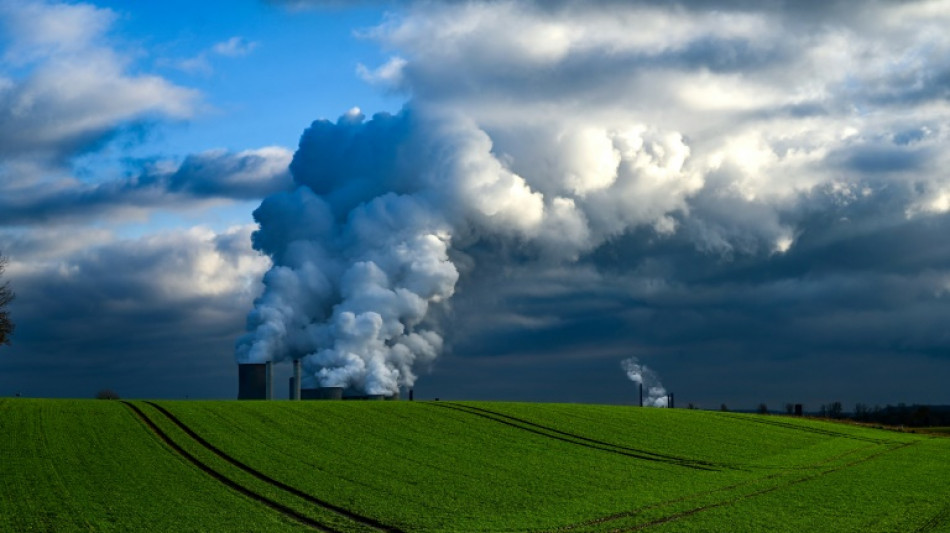
-
 Gauff-led holders USA to face Spain, Argentina at United Cup
Gauff-led holders USA to face Spain, Argentina at United Cup
-
Ecuador voters reject return of US military bases

-
 Bodyline and Bradman to Botham and Stokes: five great Ashes series
Bodyline and Bradman to Botham and Stokes: five great Ashes series
-
Iran girls kick down social barriers with karate

-
 Asian markets struggle as fears build over tech rally, US rates
Asian markets struggle as fears build over tech rally, US rates
-
Australia's 'Dad's Army' ready to show experience counts in Ashes

-
 UN Security Council set to vote on international force for Gaza
UN Security Council set to vote on international force for Gaza
-
Japan-China spat sinks tourism stocks

-
 Ecuador voters set to reject return of US military bases
Ecuador voters set to reject return of US military bases
-
Trump signals possible US talks with Venezuela's Maduro

-
 Australian Paralympics gold medallist Greco dies aged 28
Australian Paralympics gold medallist Greco dies aged 28
-
Leftist, far-right candidates go through to Chilean presidential run-off

-
 Zelensky in Paris to seek air defence help for Ukraine
Zelensky in Paris to seek air defence help for Ukraine
-
Bangladesh verdict due in ex-PM's crimes against humanity trial

-
 A pragmatic communist and a far-right leader: Chile's presidential finalists
A pragmatic communist and a far-right leader: Chile's presidential finalists
-
England ready for World Cup after perfect campaign

-
 Cervical cancer vaccine push has saved 1.4 million lives: Gavi
Cervical cancer vaccine push has saved 1.4 million lives: Gavi
-
World champion Liu wins Skate America women's crown

-
 Leftist leads Chile presidential poll, faces run-off against far right
Leftist leads Chile presidential poll, faces run-off against far right
-
Haaland's Norway thump sorry Italy to reach first World Cup since 1998

-
 Portugal, Norway book spots at 2026 World Cup
Portugal, Norway book spots at 2026 World Cup
-
Sinner hails 'amazing' ATP Finals triumph over Alcaraz

-
 UK govt defends plan to limit refugee status
UK govt defends plan to limit refugee status
-
Haaland's Norway thump Italy to qualify for first World Cup since 1998

-
 Sweden's Grant captures LPGA Annika title
Sweden's Grant captures LPGA Annika title
-
Tuchel lays down law to Bellingham after England star's frustration

-
 Sinner caps eventful year with ATP Finals triumph over great rival Alcaraz
Sinner caps eventful year with ATP Finals triumph over great rival Alcaraz
-
Portugal book spot at 2026 World Cup as England stay perfect

-
 Hakimi, Osimhen, Salah shortlisted for top African award
Hakimi, Osimhen, Salah shortlisted for top African award
-
Sinner beats great rival Alcaraz to retain ATP Finals title

-
 Schenk wins windy Bermuda Championship for first PGA title
Schenk wins windy Bermuda Championship for first PGA title
-
Crime, immigration dominate as Chile votes for president

-
 Kane double gives England record-setting finish on road to World Cup
Kane double gives England record-setting finish on road to World Cup
-
World champions South Africa add Mbonambi, Mchunu to squad

-
 Greenpeace says French uranium being sent to Russia
Greenpeace says French uranium being sent to Russia
-
'Now You See Me' sequel steals N. American box office win

-
 Argentina beat Scotland after frenzied fightback
Argentina beat Scotland after frenzied fightback
-
Argentina beat Scotland after stunning fightback

-
 Pope urges leaders not to leave poor behind
Pope urges leaders not to leave poor behind
-
Pressure will boost Germany in 'knockout' Slovakia clash, says Nagelsmann

-
 Ecuador votes on hosting foreign bases as Noboa eyes more powers
Ecuador votes on hosting foreign bases as Noboa eyes more powers
-
Portugal qualify for 2026 World Cup by thrashing Armenia

-
 Greece to supply winter gas to war battered Ukraine
Greece to supply winter gas to war battered Ukraine
-
India and Pakistan blind women show spirit of cricket with handshakes

-
 Ukraine signs deal with Greece for winter deliveries of US gas
Ukraine signs deal with Greece for winter deliveries of US gas
-
George glad England backed-up haka response with New Zealand win

-
 McIlroy loses playoff but clinches seventh Race to Dubai title
McIlroy loses playoff but clinches seventh Race to Dubai title
-
Ecuador votes on reforms as Noboa eyes anti-crime ramp-up

-
 Chileans vote in elections dominated by crime, immigration
Chileans vote in elections dominated by crime, immigration
-
Turkey seeks to host next COP as co-presidency plans falter


Climate change by numbers
As countries try to hammer out a response to climate change at the COP28 talks in Dubai, here are some key figures about how fossil fuels have warmed our world.
- Heat records tumbling -
The decade up to 2020 was easily the hottest on record, with an average global temperature 1.1 degrees Celsius warmer than the pre-industrial era (1850-1900), the World Meteorological Organization (WMO) said in a new report on Tuesday.
The heat melted glaciers and ice sheets at record levels while the seas rose by an average rate of 4.5 millimetres a year, the report said.
The WMO warned last week that 2023 is set to be the hottest year ever recorded, overtaking 2016 and 2020.
This year has been about 1.4C hotter than pre-industrial levels according to data up to the end of October, the UN agency added.
That is worryingly close to the 1.5C threshold for warming under the 2015 Paris agreement -- however that limit is measured over decades.
Under the current emissions-cutting plans, Earth is on track for disastrous heating of between 2.5C and 2.9C by 2100, the UN Environment Programme (UNEP) said last month.
Scientists say data from tree rings and the like suggests the temperatures seen this year could be the warmest in more than 100,000 years.
- How did we get here? -
Emissions of planet-heating carbon dioxide rose by 1.1% last year, climate scientists involved in the Global Carbon Project said Tuesday.
CO2 from burning fossil fuels contributes to around two thirds of all greenhouse gas emissions, according to the UNEP's Emissions Gap report.
The United States and China together accounted for 41 percent of greenhouse gas emissions in 2021, it said.
Looking back, the US was responsible for 19 percent of global warming between 1850 to 2021 -- despite having just four percent of the global population -- followed by 12 percent for China and 10 percent for the EU.
China is expected to increase CO2 emissions by four percent this year, according to the Global Carbon Project.
India's emissions surging by eight percent means it has now overtaken the EU as the third-biggest fossil fuel polluter, it added.
While 775 million people still lack electricity, the richest 10 percent worldwide emit up to 45 percent of all greenhouse gases consumed by households, according to the UN Intergovernmental Panel on Climate Change (IPCC).
- More cuts needed -
When the Paris deal was sealed in 2015, greenhouse gas emissions were projected to rise 16 percent by 2030.
Partly thanks to emissions-cutting efforts, they are now projected to increase by three percent, UNEP said.
However that is nowhere near what is needed, with the IPCC warning that they must be cut by 43 percent by 2030.
Unless more is done, the Global Carbon Project said it is a coin-flip over whether the world will pass the 1.5C limit multiple times by the end of this decade.
- Methane -
Methane is the second largest contributor to global warming after CO2, and is responsible for around 30 percent of the rise in global temperatures since the industrial revolution, according to UNEP.
Around 40 percent of human-driven methane emissions are from agriculture -- which includes gas burped out by livestock such as cows -- while 35 percent are from fossil fuels and 20 percent from solid waste and wastewater.
The UNEP has warned that methane emissions could rise 13 percent over the decade to 2030. However to reach the 1.5 Paris target, they need to fall by up to 60 percent.
- Renewable energy -
Solar, wind and other renewable energies are seen as crucial to achieving net-zero greenhouse gas emissions by 2050.
The International Energy Agency said in September that growth in solar power and electric car sales were in line with a "pathway" needed to reach that goal.
That would require global renewable energy capacity to triple by the end of the decade -- a goal more than 110 nations agreed to at the COP28 talks.
This non-binding commitment could end up in the final negotiated text agreed at the end of the two-week talks.
G.AbuGhazaleh--SF-PST




